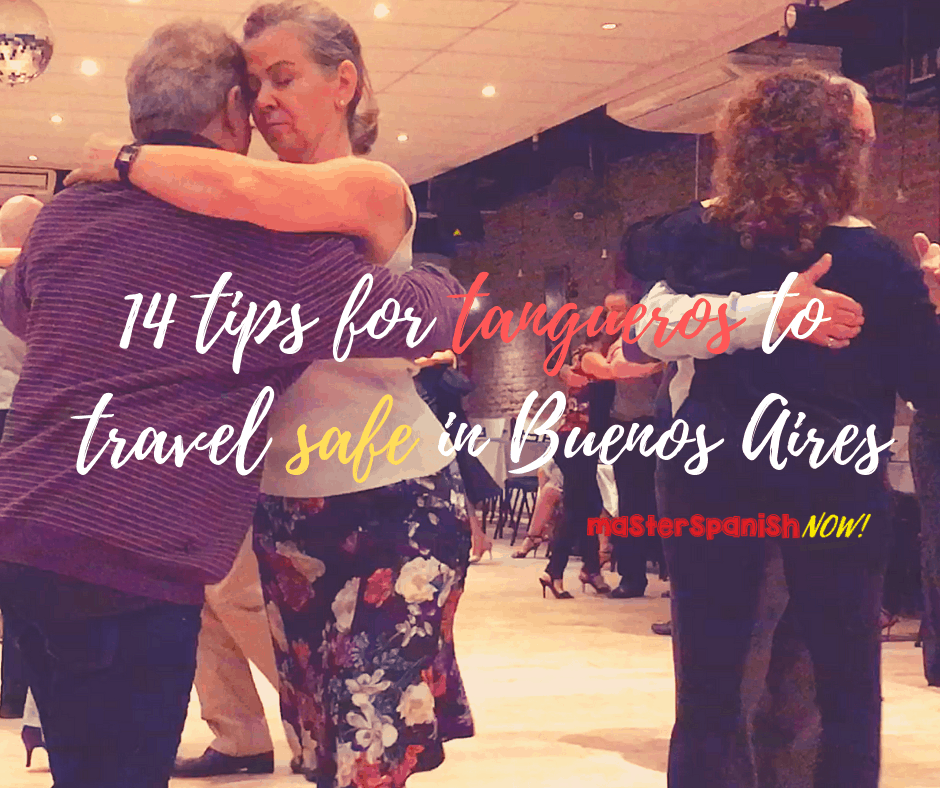“Is it safe for me to go to Buenos Aires for tango?” It is a question that I’ve been frequently asked, especially by girls who are thinking about going to Argentina alone to dance.
We tangueros (tango dancers) have all reasons to visit Buenos Aires at least once in our lifetime: to experience the authentic tango culture and understand its history; to dance in a milonga porteña (a milonga in Buenos Aires); to learn from an old tango master who don’t travel outside Argentina; and to enjoy the endless selection of tango clothes and shoes at prices which are great bargains compared to that in our home.
For tangueros who worry about the safety traveling in Argentina, their concern is actually grounded—due to volatile economy and skyrocket inflation rate, petty crimes are prevalent in the city. However, by always be watchful and act with extra caution, it’s still possible for us to have a safe trip in Buenos Aires and enjoy the most tango out of it.
Here’s are my top fourteen tips to help you stay safe in Buenos Aires, based on my two previous trips to Argentina I made on my own. I have divided the list into 2 parts: the first ten tips apply to every tourist, and the eleventh to fourteenth tips are specific for tangueros.
General tips for everybody to stay safe in Buenos Aires
1. Learn some Spanish before going to Buenos Aires
Learning a new language is always time and pain-taking but this is guaranteed to worth the effort. Nothing will show more a tourist of you than walking into a place and speak only in English. Even you speak only a few keywords, that will distinguish you to be “in the know” from being a total novice and reducing your chance of becoming a victim of a scam.
There are many ways you can learn Spanish, but the most effective way is to take online class with Argentinian Spanish teachers before traveling to the country, who will teach you not only the survival Spanish you’d need but also enlighten you on the culture of the country. You will also establish a local contest who you can contact for help in the city.
2. Observe how locals speak and behave
This is an action which has been very helpful in all my previous solo girl travel: in my first few days in a new city I’d keenly observe the locals wherever I go: in the restaurants or cafe, supermarket and subte (metro), how they interact and behave, and what are the words they use in their conversation. I spent extensive time learning Spanish in Spain and have been to Italy. Although the two European countries share a lot of similarity with Argentina, the Argentinians speak in a particular ascent and have their own set of vocabulary different from that of Spain, and they have behavior slightly distinct from Italians. Observing and mimicking the behavior of the locals and the way they speak help a lot in fitting in the crowd and be seen as someone who has been around for a while rather than a tourist who’s new to the place.
3. Avoid flashy outfits, watch and jewelry
I know it’s obvious and of common sense but please keep your Rolex and flashy jewelry in the safe before taking your flight to Argentina.
It’s always good to dress modest so you can fit in rather than standing out of the crowd when you are in a foreign country.
4. Take Uber/taxi when traveling at night in Buenos Aires
I’m a tango visitor and it means I’d need to go out a lot in late nights and return home in early mornings, and I’d usually take Uber or taxi when I’m traveling at night. While it may still be safe to travel by subte (metro) before 10pm while there are still many passengers and movement on the street, it’s better to stay on the safe side and take a Uber or taxi later at night.
While taxi is generally safe, I’d prefer Uber as I’d know the fare and the information of the driver before the trip, and this reduces my chance of falling into a taxi scam. There’s one thing you’d need to know when taking a Uber—sit next to the driver, if possible. When Uber started its service in Buenos Aires, some taxi drivers saw Uber as a threat which take away their business and were hostile and violent to Uber drivers. If you sit next to the Uber driver, it would be less easy for taxi drivers to identify the vehicle as a Uber.
If you need to flag down a taxi on the street, look for those with the sign “Radio taxi” on the door. Those taxis are managed by the Radio Taxi company and are safer to take.
5. Stay in a safe neighborhood
For solo travelers, especially ladies, it’d be important for them to stay in a safe neighborhood where they’d feel secure even they’d need to go out and return in late nights. One neighborhood recommended is Palermo which is a middle-class area and safe area. Recoleta is another high-end and secure neighborhood.
Try not to stay in Congreso area as most protests happen in that area. Protest is a norm in the city because of the many social and economic problems in the country. Whenever a protest happen the area would be crowded with protestor, streets may be blockaded and public transport disrupted. Sometimes towards the end of the demonstration things might get violent.
The La Boca area is a touristy place where is infamous for thieves and not recommended for staying.
6. Bring only the cash you need
It’s always good to have a rough estimate of how much money you’d need to spend on that day and bring only a little extra of that amount. You’d have the peace of mind knowing most of your money are safe-kept in your own place.
Most restaurants, shops and supermarkets in the city are accepting credit cards now, so you may take your credit card with you if you prefer not to bring a load of cash. Many places would ask for your documento (document) to check your identity, and they would accept your national identity card or driver license, so you can also safe-keep your passport in your place.
Many shops would still prefer cash and they would offer a discount if you pay with efectivo (cash), sometimes the discount can be hefty. What I’d do if I run out of cash is to negotiate a partial discount for the part which I pay in cash, and pay the rest in credit card; or I’d put down a deposit and ask the owner the keep my things for me, return later to pay the rest and pick my things up (usually on the way back to my place). I prefer the latter approach as I can take full advantage of the cash discount and I’d not need to carry my expensive shopping to the next distinction and risk losing them.
7. Use a traveler wallet
I’d avoid putting money in the bag I carry, instead I put the bulk of my money and credit card in a traveler wallet which goes under my clothes. Even if my bag is stolen or being snatched off on the street, I’d be able to safeguard my valuable. I’d put some money in the pocket of my jacket for small purchases so I don’t need to fumble for the wallet and expose it in the public.
8. Avoid using your cell phone on the road
Put your phone away when you are walking on the streets in Buenos Aires, especially when you are walking closer to the road. People get distracted when they are using their phone and easily fall prey to crimes. Two friends of mine had their phones snatched off by motorcyclists when they were texting on the street. If you need to use your phone to make a call or find direction, better do it inside or at least by the door of a shop or a cafe.
9. Stay away quiet streets at night
This may seem obvious but worth mentioning—avoid walking on quiet streets at night. Try to stay on avenidas (avenues) where there are more movement. For major avenida such as Avenida Corrientes, it would be safe to travel on even in late night as it’s known as “the street that never sleeps”.
10. Do not resist if you run into a robbery
If you unfortunately encounter robbery, do not resist and fight as the robber may be armed and get violent. Monetary lost is better than personal injury.
If the robber say “Dame todo” (Give me everything), give the robber your valuable. Report to the tourist police afterwards and get a report for filing for travel insurance for reimbursement after you’ve returned to your home country.
Buenos Aires Tourist Police Office
Buenos Aires has a tourist police office (near Subte station “Florida”) where you can find English-speaking police officers to report any crime you run into and ask for help.
Comisaría del Turista (Tourist police office) (24hrs)
Address: Reconquista, 1003 Ciudad de Buenos Aires, Argentina
Phone: +548009995000
Specific tips for tango visitors to stay safe in Buenos Aires
11. Bring only the necessity to milonga
When you are going to milonga, bring only the items that are necessary—the shoes, the clothes for changing, money for ticket and food and drink (In Buenos Aires milonga, food and drink are not included in the ticket, and you’d need to order separately from the bar), and the cell phone. You’d need to leave your belongings at your seat while you are out for dancing. It’s especially tricky for ladies who don’t usually have a pocket in their clothes. It’s difficult for them to use a traveler wallet as the dresses are usually tight-fit and anything underneath is easily shown.
So bringing fewer items would minimize the risk of losing them in case there’s a thief in the milonga.
12. Keep your valuable at guardarropa (cloakroom)
While it’s generally safe inside the milonga as there’s someone guarding the door and people would need to pay their ticket to get in, milonga such as La Virtua would open its door after 3am for free entry, there would be no guard at the door and people can come and go as they please, so it would be risky for you to leave your belonging at your seat unattended, especially when you go out to dance.
In La Viruta there’s a guardarropa where you can keep your bag for a small fee, which will give you a peace of mind when you are dancing.
13. Use the taxi/remise recommended by the milonga organizer
Many milonga organizers would have contact of taxi/remise (private car which take passengers for a price) drivers who work with them and are trustworthy. You can ask the organizer to call one for you if you have difficulty getting a taxi/Uber. Organizers are usually friendly and willing to help foreign tango visitors.
14. Do not carry your tango shoe bags on the street
This is a piece of advice from my Argentine tango teacher. Many tango shoes would come with a bag with a strap. Carry it on your shoulder and walk around the city shouts to people you are a rich tango tourist, which makes you an easy victim for crime. It’s better to put it inside your bag or better put it in a grocery bag and pretend you are just out for grocery shopping when you are on the way to dance.
Follow these 14 tips and have fun dancing in Buenos Aires!
Like our blog post and want to read more? Like our Facebook Page so you won’t miss our posts (plus you can find a load of FREE resources for learning Spanish for tango!)
Want more Spanish practice? You can book a 30-minute trial class for only USD7 with our Tango Spanish teachers who are tangueras living in Buenos Aires!
Going to Buenos Aires soon? Check out our books Tango Spanish and Buenos Aires Travel Tips and Tango Spanish: Essential Phrase Book For Tango Class (And Language Guide for Tango Shoe Shopping).



